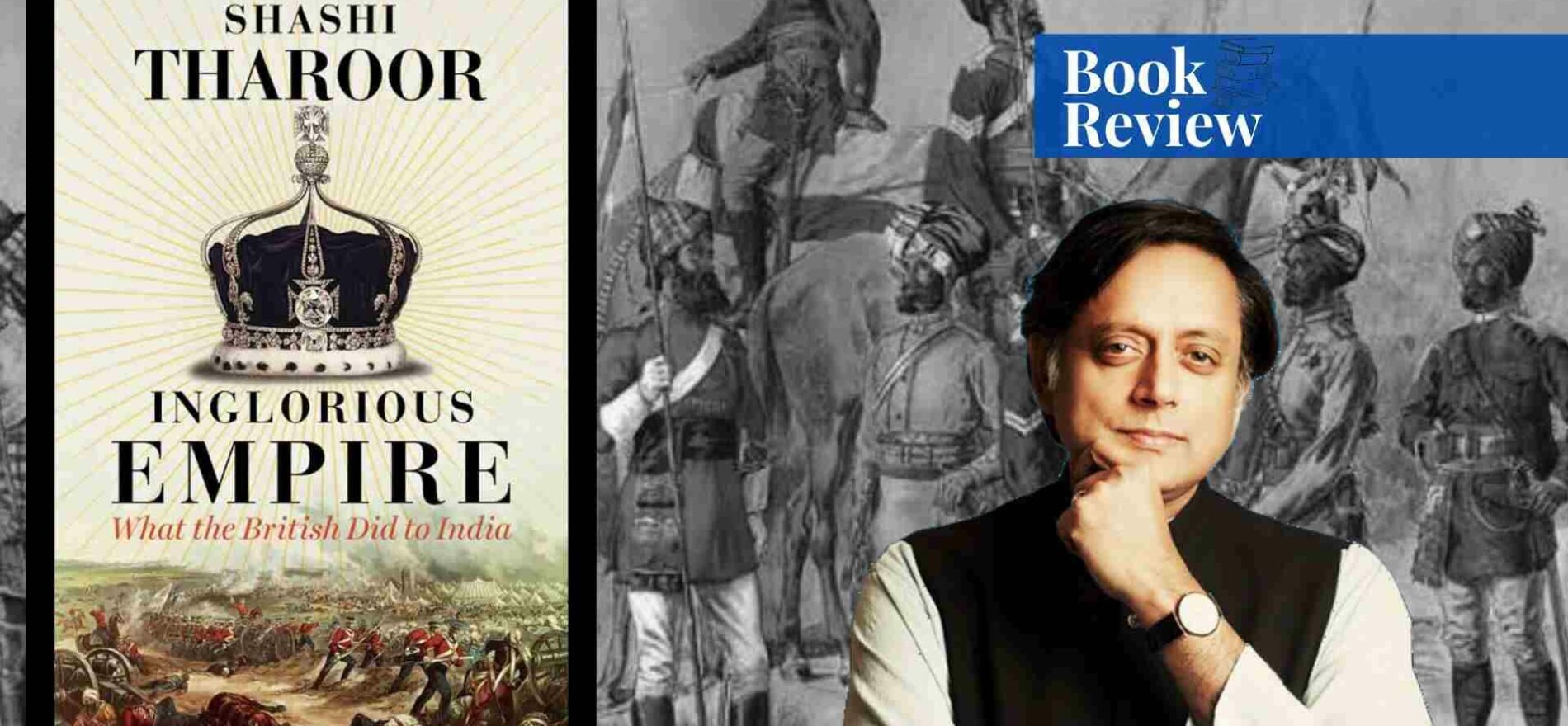Ms Fatima Mazhar is pursuing a bachelor's in International Relations from National Defense University Islamabad.
Introduction
Published in 2017, “Inglorious Empire: What the British Did to India” by Shashi Tharoor has sparked numerous discussions about imperialism’s influence on India’s sociopolitical landscape. The book has been divided into 8 chapters, with each chapter offering a rich analysis and content of the British rule in India.
Arrival of the British
The book highlights the real nature of imperialism. In the first chapter of Inglorious Empire, Shashi Tharoor talks about the East India Company, its creation, its objectives, and how it was only created for the interests and benefits of the British. Furthermore, he highlights the condition of India before the colonial rule and mentions India being famous for its fabric and textiles, particularly wool and cotton. The British imposed heavy taxes on Indians, causing Indian industry, trade, transportation, and shipping to be completely destroyed.
A United India
In the second chapter, Tharoor asserts that India would have united without the need for British intervention, and it is likely that an Indian ruler could have achieved what the British did and established his rule over the majority of the subcontinent.
Reformed Rules
The third chapter addresses how the British dismantled the earlier form of government by introducing their rules and regulations which actually did not really bring any sustainable changes. Their reforms never fitted Indians in any way.
Despots & Divisions Within
In chapter four, the author mentions that the British were responsible and answerable for the Hindu-Muslim divide and the massacres that took place. Moreover, in chapter five, Tharoor further claims that rather than being progressive, the imperial administrators were despotic.

The “Catch-22” tactic that the British actually employed is preferred over Lawrence James’ assertion that the British had inadequate and insufficient resources and other machinery but they still did their best to feed the hungry. This required the government to maintain the falsehood that the famines revealed the Indians’ lack of self-government while failing to take responsibility for the subsequent mass starvation.
(Under)development
The book’s sixth chapter challenges the notion that the historic British occupation of India benefitted the development of the Indian state today. The author disputes the idea that the railway system built by the British was a development for the better and instead refers to it as a “colonial scam.” He claimed that the railway system, which was paid by Indian taxpayers, primarily served the interests of British investors and builders.
Despite being regarded as a gift, the English language was actually used to carry out colonial laws. American globalization, rather than British imperialism, is largely responsible for it becoming the language of international business. Even though tea cultivation was profitable economically, it resulted in widespread deforestation and the extinction of wildlife.
In chapter seven of his book, Shashi acknowledges the by-products of the British rule, but he says that those were only meant to satisfy the British and not the Indians. He also talks about the growth of opium which was promoted by the British and that really harmed the Indians.
In the final chapter, Shashi Tharoor presents a different viewpoint on the British Raj’s legacy. He suggests that, rather than honouring the empire, Mahatma Gandhi should be recognized as a true tribute to the time period. Gandhi became a symbol of resistance and an inspiration for civil rights movements all over the world, thanks to his support for nonviolent resistance to racism and colonial oppression, which had a significant global impact.
Reviewer’s Opinion
The book explores a variety of aspects of British colonial rule, including manipulation of politics, chaos in society, and economic exploitation. Shashi Tharoor claims that the British Empire’s rule over India consisted of the extraction of resources, exploitation, and the passing of laws that severely restricted India’s growth and independence. The book’s thorough analysis of the economic effects of British rule is one of its strongest points.
Dr. Tharoor describes how British policies, such as taxation, trade limitations, and land revenue systems steadily drained India’s wealth and assets, resulting in underdevelopment and poverty. He also draws attention to the devastating effects of the famines that the British Empire caused, arguing that these famines were made worse by the empire’s careless policies and its emphasis on resource exportation rather than meeting the needs of the Indians.
He also talks about “post-colonial melancholia” which he describes as the craving for the British Empire’s rule in the modern day. He gives the results of a 2014 YouGov poll in which he mentions that 59 percent of the people are of the view that the rule of the British Empire was a great achievement.
To support his claims, he consults a variety of primary records, historical documents, and scholarly research. Dr. Tharoor’s narrative has authenticity and credibility due to his personal experiences as a diplomat and his in-depth knowledge of India’s colonial history.
Shashi Tharoor has criticized Niall Ferguson in the Inglorious Empire to a great extent. Ferguson claimed that the victims of the British colonial rule would soon prove to have benefitted from the rule, but Shashi counters that by saying that humans don’t lead long lives; instead, they live and experience pain in the present.
The colonial supremacy destroyed India completely. India was once the most prosperous, developed, and industrialized country, but the British rule shattered it into pieces. This colonial rule made India into one of the worst economies in the world. A 27-year life expectancy, a literacy rate of only 16 percent, and more than half of the population lived below the poverty line. Even if the Indians were far behind in progress, they could have done better on their own and flourished without the need for the British.
Tharoor asserts that the British would copy Indian spices and would wear Indian textiles and fabrics without acknowledging and giving credit to Indians. While he acknowledges the railway systems constructed by the British that are still in use by Indians to this day, he again raises an objection here and contends that the railways in the colonial time period were not made for the transport of poor Indians. Rather, the British would use them for the transport of raw materials and for their own advantages.
Despite his criticism, Shashi Tharoor acknowledges the works of good British people who actually wanted the welfare of Indians. He has given the example of Sir Arthur Cotton, a British engineer, who constructed a dam that provided water to 1.5 million acres of dry land. In this way, one can say that the book somewhat presents a balanced perspective.
Some critics believe that the book offers a largely negative perspective of British colonialism, which is slightly one-sided. Scholars are also of the view that while recognizing the negative effects is important, it would have been better to pay more attention to some of colonial rule’s beneficial outcomes, such as the development of modern legal and educational systems.
Final Comments
The book presents a deeper understanding of the British colonial rule that so many of us are still unaware of to this day. To keep readers interested, Shashi Tharoor frequently introduces passionate and significant stories, offers historical background, and raises challenging questions. The way he criticizes and presents his ideas is very powerful and mind-blowing.
I completely agree with Shashi Tharoor’s views as it was indeed a terrible and horrific rule and my sympathies are with all those people who had to live under this rule. India’s economy has improved a lot today and a great amount of the population has been pulled out of the poverty line after the departure of British rule.
The strengths of the Inglorious Empire by Shashi Tharoor are found in its comprehensive examination of the societal, cultural, and economic effects of British rule. An accurate and enlightening viewpoint is offered by Tharoor’s extensive examination of the British Empire’s economic mismanagement, cultural imperialism, and cunning politics.
Tharoor states the repercussions of colonialism that have continued to influence India’s present by highlighting the systematic robbery of India’s wealth, the destruction of traditional systems of knowledge, and the maintenance of racial and social divisions.
If you want to submit your articles, research papers, and book reviews, please check the Submissions page.
The views and opinions expressed in this book review are the reviewer’s own and do not necessarily reflect the editorial position of Paradigm Shift.



















